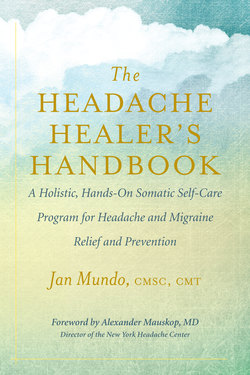Читать книгу The Headache Healer’s Handbook - Jan Mundo - Страница 7
На сайте Литреса книга снята с продажи.
ОглавлениеForeword
Headaches afflict close to half of the U.S. population, with 40 million suffering from migraines, which can be very disabling. Many books have been written for the general public, including two of my own, but Jan Mundo’s Headache Healer’s Handbook brings a unique perspective to this problem.
When I treat patients in the office, they are usually reassured by the fact that I am also a migraine sufferer, and so it is with Jan’s book — she knows firsthand what it feels like to have a migraine. More importantly, she has discovered ways to relieve her own attacks and those of countless other migraineurs.
Like Jan, I am a big proponent of nondrug treatments, and this is what she details in her book. I also like her hands-on approach, both literally and figuratively. Psychologists have proven that active treatments, where people are doing things to improve their condition, are much more effective than passive treatments, such as massage, chiropractic, and acupuncture, where things are done to them. This leads to the transfer from an external locus of control to an internal locus of control or, in other words, a shift from being a passive and helpless victim of external circumstances to being an active participant in the events with a significant degree of control.
Jan begins with the basics — identifying your type of headache and finding possible triggers that make your headaches worse. She recommends at least one visit to the doctor to confirm the diagnosis. This is important not because a brain tumor or an aneurysm is likely to be found (since those are very rare), but because a routine blood test could detect a magnesium or thyroid deficiency, anemia, or another medical problem that could be contributing to headaches.
Once your diagnosis is confirmed, with Jan’s help you can take an inventory of your diet, sleeping habits, physical environment, and posture to try to find triggers, which can be corrected. Then Jan recommends breathing exercises, which to me have echoes of the Feldenkrais Method; becoming aware of how you breathe can improve not only your breathing itself but also the movements of your chest, your spine, and the rest of your body.
In chapter 12, “Being Still: Mindfulness and Headaches,” Jan describes another powerful tool in combating headaches as well as many other physical and mental ailments. Yes, everyone is talking about the proven benefits of meditation, but it is surprising how few people actually practice it.
Chapter 13, “Posture, Ergonomics, and Sleep,” is followed by a chapter on physical exercise, which is proven not only to be good for you but to specifically reduce the frequency and the severity of headaches.
A large portion of the book is devoted to the Mundo Method, Jan’s unique hands-on therapy, which she developed to treat her own headaches and which has helped many other sufferers she has worked with. The healing power of touch is scientifically proven to dramatically improve outcomes in premature babies, and without a doubt, it can also be harnessed to relieve a variety of headache conditions. Just follow Jan’s advice, and watch your headaches go away.
— Alexander Mauskop, MD
Director, New York Headache Center
Professor of Clinical Neurology, SUNY, Downstate Medical Center
